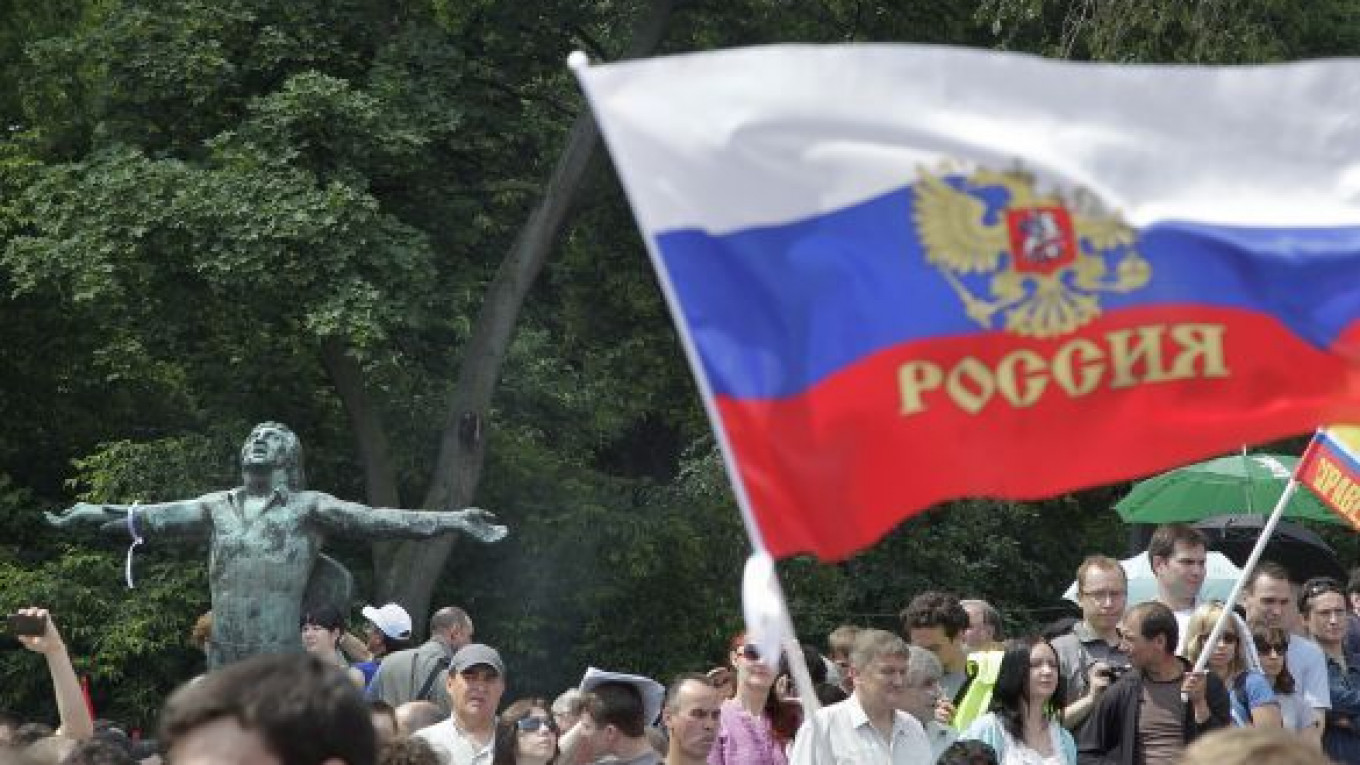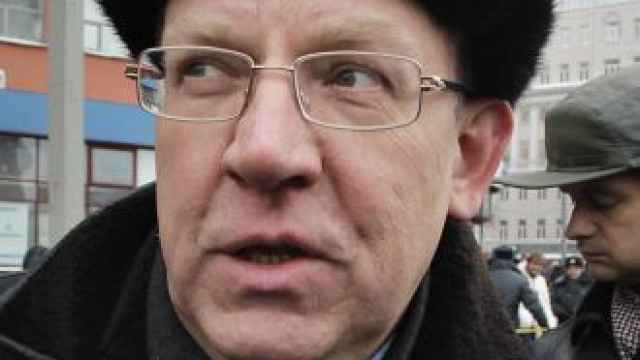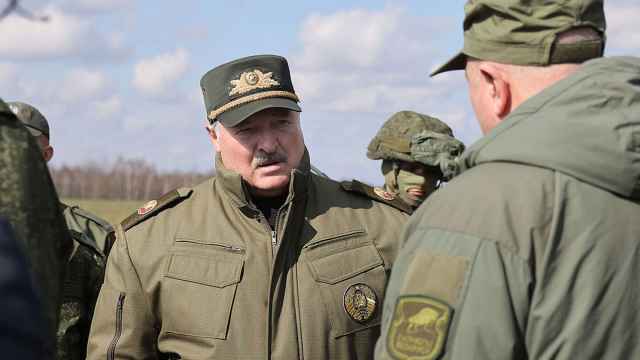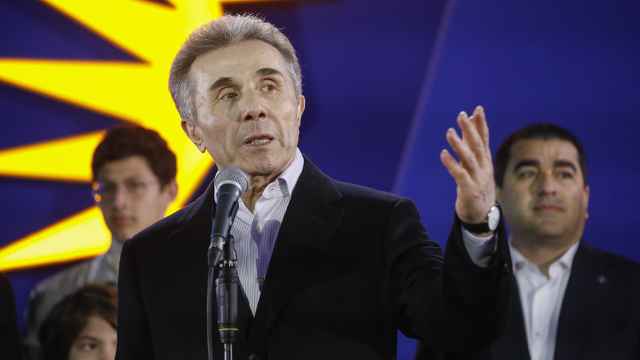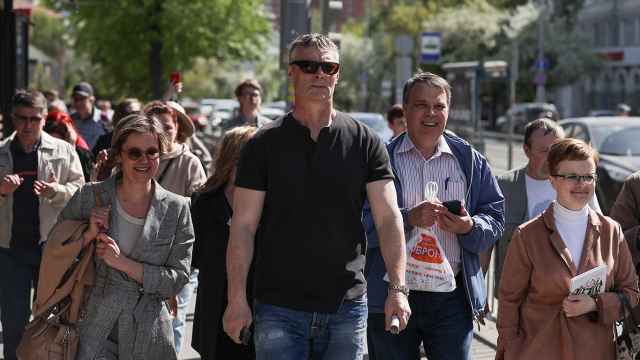The plan sounded grand: Toward the end of the summer lull, prominent opposition activists would lead an auto rally through the country, shoring up support for this fall's first big anti-government protest: Saturday's "March of Millions."
But disappointed local activists say the "White Stream" failed to become a rally at all. When it arrived in Kaluga earlier this week, it turned out to be a single car driven by Mikhail Shneider of the Party of People's Freedom, accompanied by nationalist leader Vladimir Tor, a local activist for the Democratic Choice opposition movement, Sergei Fadeyev, in his blog.
Organizers had also promised a protest with prominent opposition leaders including Solidarity head Boris Nemtsov, State Duma Deputy Ilya Ponomaryov and Left Front leader Sergei Udaltsov, but each of them had "found some valid reason not to come to Kaluga," Fadeyev said.
When locals arrived for the sanctioned protest in the city center, they could not find the rally's organizers, "who decided to have dinner in a restaurant instead," Fadeyev wrote.
Shneider admitted that the rally was basically just one car, but he denied that it was a failure.
"Nobody said there would be many cars," he said Thursday by telephone on the road from Novgorod to Tver. He explained that a large column of cars would have been slow and dangerous, whereas traveling with just one car allowed them to keep closer to schedule.
Shneider was accompanied by Ponomaryov, a Duma representative of A Just Russia, who co-organized the rally.
But he said that after arriving in cities, they were usually greeted by "two to 20 cars" that accompanied them around town and turned back when they left.
He added that he had effectively been hitchhiking, driving cars lent by activists along the way. Vehicles included "everything from a Zhiguli to a Mercedes-Benz," he said. A local entrepreneur in Rostov-on-Don lent them a helicopter, which they used to fly to Kursk.
Vladimir Milov, founder of Democratic Choice, a political group that collaborates with Yabloko and other opposition parties, said the auto rally showed that many opposition leaders were not prepared to campaign outside Moscow.
"They are only interested in sitting in Jean-Jacques [restaurant] and speaking on Dozhd TV," he said, referring to an upmarket Moscow cafe known for its opposition clientele and a privately owned online television channel.
Milov, a former deputy energy minister who has frequently clashed with other opposition leaders, said that while he welcomed those taking to the street in protest, he disapproved of the movement's leaders because their strategy was "senseless." Instead, he advocated focusing on the Oct. 14 regional elections.
But organizers of Saturday's protest promise to prove that their movement has not run out of steam.
"As a minimum we need to show that there are enough people who have not forgotten the elections," said Solidarity activist Denis Bilunov.
He added that Saturday's march, which has been agreed with City Hall for 50,000 participants, will feature calls for early elections and the release of political prisoners.
Analysts say the election theme, which fueled last winter's protests after massive allegations of fraud at December's Duma election and the March 4 Presidential election, has lost its appeal because few seriously believe that the Kremlin would give in to such demands.
"These original aims are no longer salient. The agenda has changed," said Lev Gudkov, head of the Levada Center, an independent polling agency.
To address this, organizers have added three "socio-economic" demands: a utility price freeze, a stop to "the collapse of education, health care, science and the pension system," and a guaranteed freedom for unions to operate and strike.
Opposition leaders Sergei Udaltsov and Boris Nemtsov have hailed the demands as a "big step forward."
"For the first time in the history of our protest movement, socio-economic demands will be included in a draft resolution," Nemtsov wrote on his LiveJournal blog Thursday.
Utility price hikes have proven an effective fuel for protests in the past, especially among left-leaning voters. In Moscow alone, such prices went up 11.4 percent this year, Maxim Reshetnikov, the official responsible for utility prices, said Thursday, Interfax reported. Reshetnikov added that a planned further rise in January had been deferred to July 2013.
Despite this, there were signs that attendance could fall far short of the opposition marches since December.
Less than 8,000 were signed up to attend the protest on the event's two Facebook as of late Thursday.
The protest is styled as an "all-Russia" event, with rallies, marches and flash mobs planned for more than 50 cities across Russia.
Protest organizers dismissed fears of a low turnout.
"There should be enough people because the questions that we put to the government in December remain unresolved," said Solidarity activist Ilya Yashin.
Fellow Solidarity activist Bilunov argued that social networks no longer effectively showed people's readiness. He pointed out that the last opposition march on June 12 had a bigger turnout than had been expected according to Facebook figures.
The June protest was marked by another political split, with Bilunov leading a group of Solidarity activists who refused to join the ranks of the Party of People's Freedom, known by the acronym Parnas and co-headed by Solidarity co-founder Nemtsov.
Instead, they formed the December 5th Party, in commemoration of the first spontaneous protest that broke out in central Moscow one day after the disputed Dec. 4 Duma elections.
Bilunov explained that the new party would reflect the views of those rank-and-file protest organizers who do not want to see "old faces" at the helm of the opposition movement.
"We have new people who appeal to those who went to the protests," he said. Among the planned party's founders is Maria Baronova, one of the activists charged with inciting violence at the May 6 opposition march, as well as fellow Solidarity member Sergei Davidis and civil activist Natalia Pelevina.
Yashin, who decided to stay with Parnas, denied that this represented a split. "Just because somebody has decided to create a party, it doesn't mean that there's a split in the opposition. Nobody says there should be one party for the entire opposition," he told The Moscow Times.
This Saturday's "March of Millions" will begin with an assembly at 1 p.m. , near the Chekhovskaya metro station. The march will begin at 2 p.m. along the Boulevard Ring and will end in a rally on Prospekt Akademika Sakharova at 4 p.m.
The event is scheduled to run until 10 p.m. Co-organizer Sergei Udaltsov explained the unusually long time in his blog: "We need to stand on the street as long as possible, so that it will be impossible to dismiss our demands," he wrote.
Related articles:
A Message from The Moscow Times:
Dear readers,
We are facing unprecedented challenges. Russia's Prosecutor General's Office has designated The Moscow Times as an "undesirable" organization, criminalizing our work and putting our staff at risk of prosecution. This follows our earlier unjust labeling as a "foreign agent."
These actions are direct attempts to silence independent journalism in Russia. The authorities claim our work "discredits the decisions of the Russian leadership." We see things differently: we strive to provide accurate, unbiased reporting on Russia.
We, the journalists of The Moscow Times, refuse to be silenced. But to continue our work, we need your help.
Your support, no matter how small, makes a world of difference. If you can, please support us monthly starting from just $2. It's quick to set up, and every contribution makes a significant impact.
By supporting The Moscow Times, you're defending open, independent journalism in the face of repression. Thank you for standing with us.
Remind me later.



